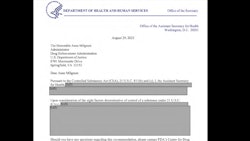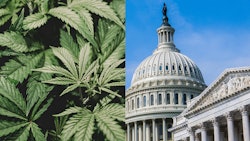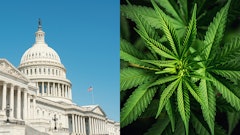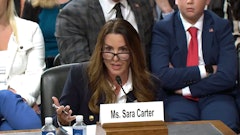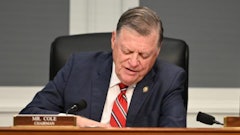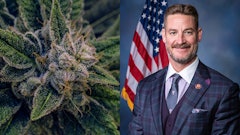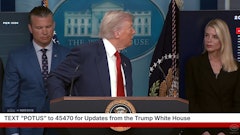
In the wake of U.S. government officials releasing documents detailing why they believe cannabis should be reclassified as a Schedule III drug under the Controlled Substances Act (CSA), Colorado Attorney General Phil Weiser is leading a multistate effort to support rescheduling.
Weiser announced Jan. 12 that he and a group of 11 other state attorneys general wrote a letter to encourage the U.S. Drug Enforcement Administration (DEA) to reschedule cannabis “in the interest of public health and safety.”
“Colorado is committed to protecting the integrity of its first-in-the-nation regulated cannabis market,” Weiser said in a public statement. Colorado was one of the first states, alongside Washington, to legalize adult-use cannabis in the 2012 election. “We recognize that there are health and safety risks raised by the use of cannabis and we must continue to take them seriously and address them. We also are confident that a well-regulated market for cannabis products best protects consumers, and this action of rescheduling cannabis will better enable that market to function.”
Weiser and the other attorneys general—who represent California, Connecticut, Delaware, Illinois, Maryland, Massachusetts, Nevada, New Jersey, Pennsylvania, Oregon and Rhode Island—addressed their letter to DEA Administrator Anne Milgram. They argued that rescheduling cannabis from Schedule I to Schedule III would allow the cannabis industry—which is regulated in 24 states for adult use and 39 for medical use—to “continue to set the standard for legal products and work to eliminate the illicit market and unregulated intoxicating hemp products that currently operate in interstate commerce.”
“Regardless of the policy choices made, demand for these products will continue,” the attorney generals wrote in the letter. “Meeting this demand only in a regulated, legal marketplace better protects consumers. Rescheduling also increases the ability to research cannabis to determine the physical and mental impacts of cannabis use. To date, this research has largely not been possible because of cannabis’s existing placement in Schedule I of the Controlled Substances Act.”
The attorneys general also highlight the economic benefits states have seen from legalizing and regulating cannabis within their jurisdictions.
“When you consider the economic impact on states, it is material,” they wrote. “The regulated cannabis marketplace currently brings billions of dollars of revenue into state and federal governments, with predictions that by 2027, retail cannabis sales will exceed $53 billion.”
The U.S. Department of Health and Human Services (HHS) recommended in August that cannabis be reclassified under the CSA. The recommendation came in response to President Joe Biden’s October 2022 directive that Secretary Xavier Becerra and Attorney General Merrick Garland initiate an administrative review process on cannabis’s CSA scheduling via a medical and scientific analysis. The DEA now has final authority to reschedule cannabis based on findings presented by the HHS and the U.S. Food and Drug Administration (FDA).
RELATED: Former US Attorneys Urge Federal Officials to Reject Cannabis Rescheduling Recommendation
While the DEA initially released a heavily redacted version of the August letter detailing the HHS’ cannabis rescheduling recommendation, it has since released the letter as well as documents detailing why federal officials believe cannabis should be reclassified under federal law.
Some of those reasons include cannabis’s purported medical benefits, as well as evidence suggesting that cannabis does not pose a significant risk to public health.
RELATED: Cannabis Rescheduling Document Details Rationale For Schedule III Recommendation
The DEA reiterated its authority over rescheduling decisions in a December letter to U.S. Rep. Earl Blumenauer, D-Ore., as previously reported by Cannabis Business Times.
Since the August announcement that HHS had sent its scheduling recommendation to the DEA, multiple officials have urged the agency to move cannabis to Schedule III as quickly as possible.
U.S. Sen. Kristin Gillibrand, D-N.Y., for example, sent a letter to Milgram in November urging her to reclassify cannabis as a Schedule III drug. Her correspondence followed an October letter signed by 31 bipartisan House lawmakers who also called on Milgram to reschedule cannabis under federal law.
Shane Pennington, partner at Porter Wright Morris & Arthur, told CBT earlier this month that the DEA is still early in its process of determining whether to accept HHS’s rescheduling recommendation.
“DEA has HHS’s recommendation, which is an important step, but it’s very preliminary because we’re going to get, eventually, a proposed rule from DEA, then we’ll get notice and comment for 60 days, [a] public comment period,” Pennington said. “And at the same time, DEA will allow interested parties to request hearings on the record.”
Then, once the DEA writes the final rule, there will be another waiting period before implementation; Pennington said the DEA generally requires a 30-day delay between the time a rule is published and an effective date.
Still, Weiser and company are adamant in their letter that Milgram move swiftly to reschedule cannabis to more closely align federal policy with state-legal cannabis programs.
“Our regulatory regimes have sought to balance the mandate to create as safe a framework as possible with the reality of these risks,” the attorneys general wrote in the letter. “Juxtaposed against the dangers of the illicit market and unregulated hemp-derived cannabinoids, moreover, we believe that there is a public health and safety mandate to protect the state-regulated industry by rescheduling cannabis to Schedule III.
“For these reasons, the undersigned agree that rescheduling cannabis to Schedule III is the next step in the move towards a more accountable cannabis policy. We stand ready to continue work with your agency to ensure that the state regulatory programs continue to exist under evolving federal cannabis policies.”











